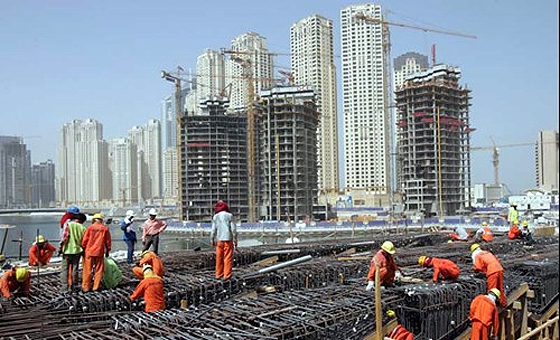The Middle East’s construction market is set to grow at a faster pace than any other region in the world this year, according to analysts BMI Research.
The firm has published a paper on the Mena infrastructure sector in which it argues that buoyant markets in the UAE, Qatar, Oman and Egypt will power 6 per cent overall growth in the Middle East in 2017, up from 5.3 per cent last year.
"This outpaces long-time leading region sub-Saharan Africa, which will take longer to recover from the end of the commodity price super-cycle and struggles comparatively to Mena in attracting foreign investment in real estate and infrastructure," the report said.
It argued that the recent improvement in oil prices "will allow for governments to firm up spending plans" following several years of uncertainty in which projects were either placed on hold or cut.
It also said the UAE would reclaim its crown as the biggest projects market in the region from Saudi Arabia for the first time since 2012, due mainly to budgetary constraints in the kingdom.
"We note that it will be 2020 before Saudi Arabia again overtakes the UAE as the largest construction market in the Mena region," the report said.
Mike Collings, the Middle East managing director of project management firm Turner & Townsend, argued that BMI’s forecast seemed slightly over-optimistic – especially in terms of a forecast of 12 per cent growth for Qatar’s construction market, as 2017 becomes the ‘peak year" for contract awards in the run-up to the Fifa 2022 World Cup.
"Qatar needs to stimulate growth it if it is going to deliver all it needs to make an absolute success of 2022," said Mr Collings.
He also argued that the UAE remains a "split" market, with rationalizations still taking place at a number of government-run entities in Abu Dhabi, but Dubai enjoying strong growth as a result of major developers looking to get projects awarded ahead of Expo 2020.
"To use a footballing analogy, I anticipate this being like a game of two halves. I certainly don’t think the increase in oil prices we have seen to date has been a panacea, but I do think that if the oil price starts to stabilize above $50 a barrel, it will create confidence.
"We’ll see a bit more confidence returning to the marketplace in the second half of this year, and then hopefully beyond we will see an improving market."
David Clifton, business development director at Faithful + Gould, agreed. His firm is forecasting a 5 per cent increase in contract awards in the UAE this year, despite a softening of real estate prices, which is placing pressure on some mixed-use private sector projects.
He also said that the Abu Dhabi market is likely to remain "slow", but added that the in the fourth quarter of 2016 there was a pick-up in tender activity, which should lead to a growth in project awards in the first quarter of this year.
"So we see a bit of an increase, but I think you’re going to start to see it coming through in terms of tenders at the back end of this year."
Bishoy Azmy, the chief executive of Al Shafar General Contracting, said: "I’m quite optimistic for 2017. I think the government of Dubai, particularly, has been adamant to ensure there is no slowdown or negative headwinds in the region. The government is proceeding with significant infrastructure investments and the major developers are also launching one project after the other. I see activity on both fronts. But so far, on Abu Dhabi, it’s very quiet."
The National
23 January
























































